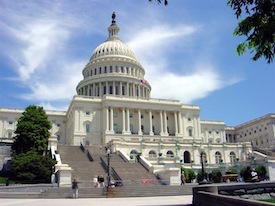Congress Reaching Agreement on Iran Sanctions
June 22, 2010
Featured Image
We are happy to serve you a daily summary of the day's top nuclear policy stories each morning, with excerpts from the stories in bullet form.
Stories we're following today: Tuesday, June 22, 2010
Lawmakers Reach Deal on Iran Sanctions - Associated Press
- House and Senate negotiators said Monday they have reached agreement on a new round of economic sanctions against Iran aimed at dissuading the Tehran government from pursuing the development of nuclear weapons.
- The latest proposed sanctions against Iran focus on disrupting exports of gasoline and other refined petroleum products to Iran and banning U.S. banks from doing business with foreign banks that provide financial services to Iran's Revolutionary Guard.
- The agreement needs to be approved by other members of the House-Senate conference, but it enjoys wide congressional support and is expected to move quickly toward final votes in the two chambers.
The Reset is Working - Nikolas Gvosdev in The National Interest [link]
- The Obama team deserves credit for its willingness to change the dynamics of the U.S.-Russia relationship, particularly the tone of the dialogue, and for its recognition of the need to incentivize support for American goals.
- But the diplomatic efforts of other states—and their willingness to also engage the Kremlin even when strongly criticized by some elements of the political establishment in the United States—should also be acknowledged.
- Nicolas Sarkozy, and now Barack Obama, seem to have embraced the James Baker strategy of making it “worth the while” for the Russian government to change its position on Iran. Because what Paris and Washington have offered could end up benefiting some of the major economic stakeholders—the oil and gas sector, the nuclear industry and the military-industrial complex—we may see a continuing shift in Russian policy toward Iran.
Why Iran Booted Two Nuclear Inspectors - Max Fisher in the Atlantic [link]
- Iran has barred two nuclear inspectors from the International Atomic Energy Agency (IAEA) from the country… The IAEA will be allowed to remain in Iran, however. Here's what happened and why:
- The Financial Times' Najmeh Bozorgmehr writes, "Barring the inspectors could be Iran’s response to a new round of UN-imposed sanctions passed earlier this month.
- Reuters' Hossein Jaseb and Sylvia Westall explain, "Ties between Iran and the IAEA have become more strained since Yukiya Amano took over as head of the agency in December.
- The Associated Press Nasser Karimi paints the larger picture. "The ban is the latest twist in Iran's deepening tussle with the U.N.'s International Atomic Energy Agency and the West over its nuclear program.
Moving Beyond the Honeymoon - Andrew Kuchins in The Moscow Times [link]
- The signing of the New START treaty in April, increasing cooperation in Afghanistan, and a United Nations Security Council agreement over new sanctions on Iran all testify to the growing rapprochement between Moscow and Washington. Even Russian television commentators of the U.S.-Slovenia World Cup match on Friday agreed that the U.S. team had been robbed of victory by a terrible call by the referee.
- We should think about how this honeymoon can evolve into a stable, long-term marriage rather than the bitter acrimony of the recent past.
- At the St. Petersburg forum, many Russian business leaders asked what will be next on the reset agenda. It is essential that the U.S. Congress ratify the New START, approve a “123 Agreement” that will provide for increased U.S.-Russian cooperation in the civilian nuclear sphere, finally remove the Jackson-Vanik amendment and support Russia’s accession into the World Trade Organization.
A View from the Dark Side
Should the New START be a Non-Starter? - Rebeccah Heinrichs in Fox News [link]
- The new treaty will have lasting implications for global security, and deliberation on it should take months, if not longer, to ensure that the Senate can be fully informed and comfortable voting to approve or reject it.
- While the administration is clear about how many nukes and delivery platforms it’s willing to get rid of, it remains unclear about how we’ll modernize the nukes and delivery systems we intend to keep.
- Although the [1251 Plan for nuclear modernizations] itself is classified, the controversy it has created in the Senate is not. One of the greatest take-aways from 1251 comes less from what it includes than from what it leaves out. It seems to offer almost no detail on what the future makeup of U.S. nuclear forces might look like under New START.
- Before they vote on the New START Treaty, Senators should probe the administration about how it expects U.S. nuclear forces to look under the new restrictions. Without a robust triad, U.S. nuclear deterrence will be devastatingly shortchanged, and so will American security.
World Cup Fever
North Korea Broadcasts Live Match on TV for First Time - The Guardian [link]
- Of all the games to choose for a first live broadcast during this World Cup, a 7-0 drubbing was probably the last thing the authorities in North Korea wanted to see.
- The political implications are hard to gauge. The heavy loss will certainly have been a blow to a pride-conscious nation, but the realism of many fans about their team's chances may have softened the impact.
- While some hoped for revenge against Portugal – who knocked North Korea out of the World Cup during their last appearance in the finals, in 1966 – there was widespread understanding that they are a superior side.



